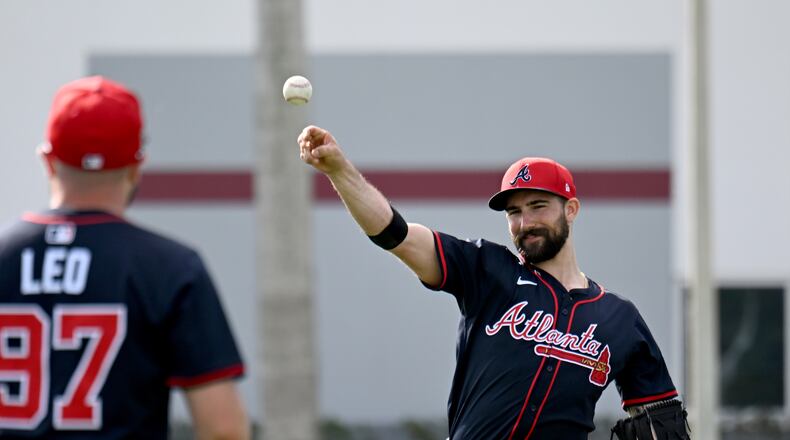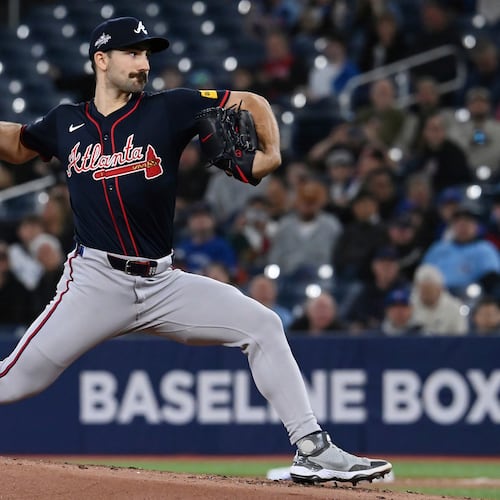NORTH PORT, Fla. – On Saturday morning, Spencer Strider uttered one line that may represent him as well as anything he has ever said.
“Mastery is something that doesn’t really have a destination,” Strider said in front of his locker.
This is, in a quote, the essence of Strider. On the mound, he fires a superhuman triple-digit fastball. Behind the scenes, he’s as calculated as anyone. He has fallen in love with the process over the outcome – part of the influence of his appreciation for sports psychology.
Since undergoing an internal brace procedure to repair his ulnar collateral ligament last April, Strider has been out of action – at least to the public eye. He has not been able to strike anyone out. He has not been able to feel the adrenaline of competing against the best. He has not been able to fuel himself with a raucous crowd that erupts with every big moment.
All he has had is a process – the rehab process. Process, process, process.
Remember: Mastery of a craft does not have a destination.
“It’s hard to define (mastery),” Strider said. “You don’t really know when it happens, you just know that somebody’s a master at something. I’m not calling myself a master, but I think that’s kind of what I’ve been able to focus in on. There were no outcomes to define myself. That identity, that ego was not fed by anything on the field. So, you’re spending a lot of time with yourself. Delayed gratification is absolutely the main component of a rehab process. Just trying to find ways to get better and ultimately enjoy that progress and that learning process.”
Now, Strider is in spring training having a somewhat normal camp. At some point, the Braves expect him to pitch in a spring training game – though that could change. The team doesn’t believe he’ll miss a significant chunk of the season. Barring any setbacks, he should return sooner rather than later after opening day, though no one has given an exact timeline.
Credit: HYOSUB SHIN / AJC
Credit: HYOSUB SHIN / AJC
Strider on Friday threw his latest bullpen session. Eventually, he’ll graduate to throwing live batting practice. At the guidance of the training staff, he’s incrementally building up as he looks to return from his second elbow surgery.
He’s been focused on the process.
“I think what you’re ultimate talking about is defining why you do something. It’s the purpose,” Strider said. “And for me, I’ve never had motivation issues with baseball. Of course, there’s times where you’re discouraged, you’re not as motivated for a number of reasons. But ultimately, there’s that inherent love for the game that I have that makes it easier for me. I think reverting back to the mastery concept, I think that’s really what it’s about – understanding every component of your life is about improvement and optimization. Whether you can identify a one to one correlation to how that improves your skill at baseball I don’t think is instrumental.
“Everybody’s life journey here is about just being a better person, right, in any way you can. And that’s something that I think I’ve really come to understand is what I enjoy, is just finding ways to be better in any way. Because if I do one little thing better, it gives me that much better of a chance at being successful on the baseball field.”
Eventually, Strider, Chris Sale, Reynaldo López and Spencer Schwellenbach will be in the same rotation for Atlanta. Grant Holmes or Ian Anderson could be the fifth starter. The Braves lost Max Fried and Charlie Morton, but this could still be a great rotation.
There are questions, though. A few of them.
Can Strider return to elite form when he’s back?
Can Sale stay healthy?
Will López and Schwellenbach repeat their previous seasons?
“I mean, it’s high,” Strider said of this starting rotation’s ceiling. “I think this group is especially focused just on the process. More so than any that I’ve been a part of here, you’ve got a lot of independent, focused guys who are very in tune with the purpose behind what they’re doing and understand the concept of getting to 180-plus innings. We’re in this for in the long haul and trying to peak at the right time. That comes down to just focusing on the present moment, each day having a purpose and good plan. And consequently, I think we have a very high ceiling.”
Strider spent much of the offseason rehabbing at Truist Park. Before heading down to North Port, he threw his bullpen sessions at Maven Baseball Lab, which features useful data and metrics he can evaluate throughout his process.
Strider credited the Braves’ training staff for helping with the fine balance of working hard but not too hard. At this point, he said, they’re working on flipping the switch to allow him to compete again. He hasn’t truly competed in almost a year. He doesn’t feel too far off of how he would at this time during a fully healthy spring, though.
Strider said there’s a calendar – on paper – of his schedule. But it’s mostly for reference. Strider and the training staff have used context and feel to move him forward toward pitching again. There are a lot of judgement calls.
The Braves expect Strider will be ready when his time comes.
“I say it, he’s very focused on what he’s doing and dedicated,” Braves manager Brian Snitker said. “You knew when they were talking about what he was going to go through, it’s like, if anybody can do it, he can, because he’s not going to take any shortcuts and he’s going to be very dedicated in what he’s doing, and consistent in what he’s doing. I think that’s going to allow him to come back and be a very elite pitcher again.”
Strider is excited to be going through a somewhat normal spring, even if he won’t be on the opening day roster. He’s felt the support from his teammates, who have consistently texted him to ask how he’s doing.
“I know they probably will get sick of me being around once I’m back and bothering them all the time, but they must miss me right now, so that definitely feels good,” Strider said.
About the Author
Keep Reading
The Latest
Featured



